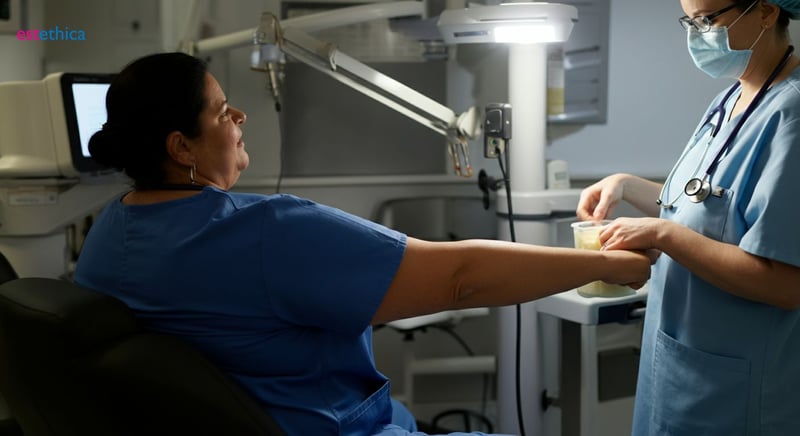Unlock a New You: The Bariatric Surgery Transformation
Bariatric surgery can transform your life. Discover eligibility, procedures, and lasting benefits for a healthier you.
Bariatric surgery can be a life-changing procedure, offering individuals a path to significant and sustained weight loss. As obesity rates climb globally, weight loss surgeries such as gastric bypass and sleeve gastrectomy offer an effective remedy. However, the journey is a serious one that involves careful consideration and a commitment to lifestyle changes.
Is Weight Loss Surgery Right for You? Eligibility Explored
Comprehensive Assessment for Bariatric Surgery Candidates
Deciding on bariatric surgery requires a thorough evaluation that goes beyond just Body Mass Index (BMI). It necessitates a deep dive into a candidate's commitment to adopting significant lifestyle changes, which are vital for achieving lasting weight loss. Preparing for weight loss surgery involves understanding the long-term implications and the necessity of adhering to new dietary guidelines and maintaining a consistent exercise regimen post-operation. A crucial aspect of this readiness is the psychological fortitude to navigate the considerable personal transformation following obesity surgery. These lifestyle adjustments affect the body in myriad ways and call for serious dedication to ensure the best outcomes.
Key Factors in Determining Bariatric Surgery Suitability
When considering whether bariatric surgery is the right choice, several factors play a critical role. The journey from initial consultation to life after bariatric surgery involves a multifaceted approach that assesses both the physical and emotional preparedness of each patient. It's not only about meeting specific weight criteria; it includes demonstrating an understanding of what to expect after bariatric surgery and exhibiting a commitment to the extensive lifestyle adjustments required. These adjustments range from adapting to smaller meal portions to incorporating regular physical activities. The nice bariatric surgery guidelines emphasize the need to explore all non-surgical weight loss options before considering surgery. This comprehensive evaluation helps ensure patients are fully aware of the responsibilities involved and are equipped for the long-term success following bariatric surgery. For more insights, you might find valuable information on Bariatric Surgery Options.

Bariatric Surgery Options: Navigating Gastric Bypass, Sleeve & More
Understanding Gastric Bypass and Its Impact on Weight Loss
Gastric bypass, a prevalent form of bariatric surgery, fundamentally alters how your stomach and small intestine manage food. The procedure involves creating a small stomach pouch and connecting it directly to the small intestine, effectively bypassing a significant portion of the stomach and duodenum. This not only limits the amount of food you can eat but also reduces the absorption of calories, leading to weight loss. However, potential candidates should be aware of the bariatric bypass surgery recovery time, which typically involves an initial hospital stay followed by several weeks of dietary adjustments. Careful adherence to post-operative guidelines is crucial to minimize complications and ensure optimal outcomes.
- Reduced Stomach Size: Limits food intake to promote weight loss.
- Altered Digestion: Decreases calorie absorption for enhanced weight management.
- Hormonal Changes: Positively impacts hormones related to hunger and fullness.
Sleeve Gastrectomy: A Closer Look at Stomach Reduction
Sleeve gastrectomy involves removing about 80% of the stomach, leaving a smaller, tube-like structure. This significantly reduces the stomach's capacity, limiting the amount of food that can be consumed. Beyond physical restriction, the procedure impacts gut hormones, such as ghrelin, which plays a role in appetite regulation. Patients often experience a noticeable decrease in hunger, contributing to weight loss. Notably, sleeve gastrectomy does not involve bypassing any part of the intestine, which simplifies the procedure compared to gastric bypass. The nice bariatric surgery guidelines provide insights into the criteria for selecting this surgery based on individual health profiles and weight loss goals. Furthermore, adherence to healthy habits post-surgery is essential for maintaining long-term weight management.
- Stomach Reduction: Limits food intake drastically.
- Hormonal Effects: Reduces ghrelin production, decreasing appetite.
- No Intestinal Bypass: Simplifies the surgical process and recovery.

Beyond the Procedure: Preparing for a Lifetime of Healthy Habits
Building a Foundation for Sustained Weight Management
Adapting to life after bariatric surgery requires more than just physical recovery; it demands a complete overhaul of lifestyle habits. Central to this transformation is establishing a close partnership with a nutritionist who can guide you through the essential dietary changes. These changes are not temporary fixes but permanent adjustments to promote long-term health. Equally important is identifying and joining a support group where you can connect with individuals who have undergone similar experiences. Sharing challenges and successes within this community can provide invaluable emotional support and practical advice. According to the nice bariatric surgery guidelines, mental and emotional readiness are just as significant as physical health when predicting the success of weight loss interventions.
- Nutritional Guidance: Tailored diet plans for post-surgery needs.
- Emotional Support: Community engagement for shared experiences.
- Behavior Modification: Adjusting lifestyle habits for long-term success.
The Role of Continuous Learning in Maintaining Weight Loss Results
The journey post- weight loss surgery is one of continuous learning and adaptation. Understanding the risks of bariatric surgery and recognizing the signs of potential complications are critical for proactive health management. Patients should be well-informed about how their bodies respond to surgery and dedicated to monitoring their health indicators. Additionally, staying informed about the latest research and advancements in bariatric care can provide valuable insights to optimize health outcomes. This ongoing education ensures patients remain committed to their health and are equipped to handle any challenges that may arise. The success of bariatric surgery heavily depends on the patient's active involvement and commitment to lifelong changes.
- Health Monitoring: Regular check-ups and awareness of body changes.
- Lifelong Learning: Staying informed on best practices in bariatric care.
- Adaptive Lifestyle: Adjusting habits to meet evolving health needs.

Life After Bariatric Surgery: What to Expect on Your Journey
Navigating the Initial Months Post-Surgery
Following bariatric surgery, significant changes occur within the first few months as your body adapts to the new dietary and physical structure. These initial months are crucial for setting the foundation for long-term weight management. During this period, patients typically experience the most rapid weight loss, which can be both motivating and challenging. One of the key adjustments involves learning to eat smaller portions and adapting to new textures and types of food. The bariatric bypass surgery recovery time involves gradually reintroducing solid foods, often starting with liquids and purees. Adhering to post-operative guidelines is essential to minimize discomfort and avoid complications. This stage requires close monitoring and frequent consultations with healthcare professionals to ensure the body is healing properly.
- Dietary Adjustments: Learning to eat small, frequent meals.
- Physical Recovery: Allowing the body to heal and adapt.
- Regular Check-ups: Monitoring progress and addressing concerns.
Sustaining Long-Term Success After Weight Loss Surgery
Achieving sustained improvements and preventing weight regain after weight loss surgery depends largely on adherence to lifestyle changes, including regular exercise and a balanced diet. Continued commitment to follow-up appointments with surgeons, nutritionists, and other healthcare providers ensures potential issues are addressed early. Engaging in regular physical activity not only supports weight maintenance but also improves overall health. Developing healthy habits post-surgery, such as mindful eating and stress management, is crucial for long-term success. Support groups can play a vital role in providing ongoing encouragement and practical advice. Remember, robotic bariatric surgery and non-surgical weight loss options may require different post-operative care. Staying informed and proactive helps ensure a healthier future.
- Consistent Exercise: Regular physical activity for weight maintenance.
- Balanced Diet: Maintaining a healthy diet with appropriate portion sizes.
- Ongoing Support: Engaging in support groups and healthcare follow-ups.
Understanding Bariatric Surgery: A Comprehensive Guide
Advanced Bariatric Techniques: Gastric Bypass and Sleeve Gastrectomy
Personalized Care and Continuous Support for Lasting Transformation
Frequently Asked Questions
Who is typically eligible for Bariatric Surgery?
What are the main options in Bariatric Surgery?
What does life after Bariatric Surgery involve?
How do healthy habits post-surgery contribute to successful weight management?
What are the key considerations for preparing for Bariatric Surgery?
Ready to discover your path to healthy beauty with personalized care and innovative treatments?
📞 Book Your Free Consultation!